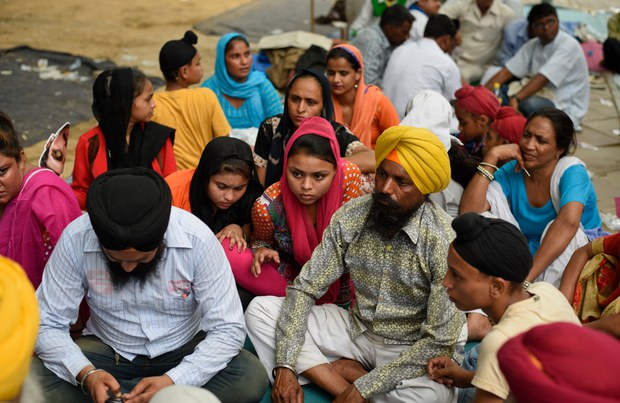Indian Court Sentences 3 Dalits to Death for Raping, Killing Teen
2017.11.29
Mumbai and New Delhi
 Members of India’s low-caste Dalit community listen to a leader as they gather for a protest near the Indian parliament in New Delhi, May 21, 2017.
Members of India’s low-caste Dalit community listen to a leader as they gather for a protest near the Indian parliament in New Delhi, May 21, 2017.
Women’s rights activists slammed an Indian court’s decision Wednesday to sentence three low-caste men to death for raping and killing an upper-caste teenage girl in Maharashtra state last year, saying the justice system was stacked against the marginalized Dalit community.
Indian courts tend to punish Dalits who have committed crimes but are more lenient toward members of other communities who have committed crimes against Dalits, who form the lowest rung of Hinduism’s caste hierarchy, activists alleged.
The special fast-track court in Ahmednagar district on Nov. 18 had found defendants Jitendra Shinde, 25, Nitin Bhailume, 26 and Santosh Bhawal, 35 – all Dalits – guilty of rape, murder and criminal conspiracy charges in the July 2016 crime, which provoked statewide protests.
“All incidents of rape and murder should trigger anger and demands for justice. But in this case, it seems the anger was directed toward the entire Dalit community,” Mumbai-based rights activist Kamayani Mahabal told BenarNews.
The 15-year-old victim in this case, an upper-caste Maratha, was found brutally slain in a field in the district’s remote Kopardi village in July 2016. Her hair had been pulled out, her bones and teeth were shattered and there were bite marks all over her body, the victim’s autopsy report said.
The killing evoked comparisons to an infamous gang-rape in New Delhi five years ago when a medical student was savagely assaulted inside a moving bus.
‘Unequal justice’
After the rape-murder, the Maratha community staged protest marches across Maharashtra demanding the scrapping of the Schedule Caste/Schedule Tribe Atrocities Act, which aims to end caste-based discrimination and violence. The Marathas account for about 40 percent of Ahmednagar district’s 4.5 million population.
India’s nearly 180 million strong Dalit community has been at the receiving end of frequently violent caste-related discrimination for centuries.
“If guilt is proved beyond reasonable doubt then the accused should be punished because justice means upholding the rights of people equally across all strata of society,” Ritu Dewan, president of the Indian Association for Women’s Studies, told BenarNews.
“But when no cognizance is taken of people being lynched because they belong to minority communities or because they belong to lower castes in India’s highly stratified society, the very meaning of justice becomes lopsided and meaningless. It becomes the case of unequal justice,” she added.
Riya Ray, a social science researcher at Delhi University, agreed.
“This verdict is a perfect example of caste-based biases and prejudices where we act according to the caste of the perpetrators, while so many rapes and murders of Dalits are rarely even investigated properly,” she told Benar.
‘My daughter’s never coming back’
The police charge-sheet stated the perpetrators and the victim lived in the same village. Under Indian law, the victim cannot be identified because she was a minor at the time of the crime. On July 13, 2016, the victim was returning home on a bicycle when Shinde, one of the convicts, dragged her to a nearby field and tortured and raped her, police said.
Shinde then called two of his friends – Bhailume and Bhawal – who took turns raping the victim before strangling her, police said.
The victim’s mother, who did not wish to be identified, told BenarNews by phone that the verdict was a tribute to her daughter.
“My daughter’s never coming back. But wherever she is, she will be happy that her rapists and killers have been dealt a suitable punishment,” she said.
Devendra Fadnavis, Maharashtra’s chief minister, was among politicians who praised Wednesday’s ruling by the special court.
“Kopardi was an extremely unfortunate incident which resulted in massive reactions across the state,” Fadnavis told reporters in Mumbai. “The victim’s soul will find peace after this judgement, and people's faith in the judicial system will increase.”
During the concluding arguments last week, public prosecutor Ujjwal Nikam urged the court to award death penalties to the three offenders as they remained unrepentant of their crime.
The “society would get a wrong message if the death sentence was not awarded in so gory a case,” Nikam had said, according to The Hindu.
However, defense lawyers for the accused pleaded for leniency for their clients, saying that condemning them to death could increase social tensions between the Dalit and the Maratha communities.
The convicted trio likely will challenge the verdict in the Bombay High Court, defense lawyers said following Wednesday’s judgment.







